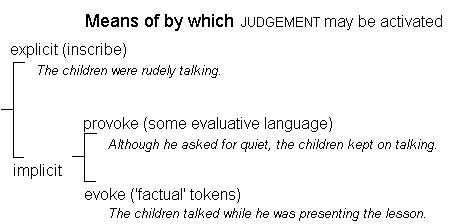


It is necessary, however, to acknowledge that the distinction is not always so clear cut between the explicit and implicit Evaluation. Consider, for example, the following
In (1) one we have an unproblematically explicit inscription of a value of JUDGEMENT - through the word 'rudely' which necessarily indicates a negative assessment of those who were talking. But what about (2)?. Here there is no word or wording which, of itself, indicates a positive or negative assessment. And yet there is still something vaguely accusatory or critical about the wording - specifically the use of the wordings 'although' and perhaps 'whole room' and 'kept on'. As I've said, none of these formulations could be said, of themselves, to convey a negative or positive assessment - they are not 'attitudinal' in the sense of the term I'm using here. But they are, nevertheless, evaluative. Thus the term 'although' indicates an assessment by which the happening described in the second clause ('the whole room kept on chattering') is represented as in some way unexpected, abnormal or untoward. Similarly, 'kept on' involves an assessment that the 'talking' went on longer than was expected or was acceptable - that we might have expected it to have stopped before this. The wording, 'whole room' involves a sense of intensification, a sense of that the writer/speaker is somehow more invested or involved in the utterance than is always the case. We thus have evaluations of counter-expectation and intensity. What does this mean for our analysis of JUDGEMENT. Do we see this as inscribed (explicit) JUDGEMENT or as evoked (implicit) JUDGEMENT. Well actually, we see it as somewhere in between. Although the utterance contains no values of explicit JUDGEMENT (or of any other type of ATTITUDE), it does employ evaluative language and these wordings act to direct us towards a Judgemental response. Accordingly, we say that in such an utterance, an inference of a JUDGEMENT value is provoked in the reader/writer (as opposed to evoked.) Thus JUDGEMENT may be inscribed (explicit), provoked (implicit) or evoked (implicit).

Figure 1: modes of judgement